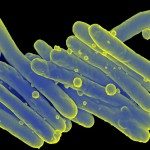Lien vers Pubmed [PMID] – 29335553
Nat Microbiol, 2018 Feb;3(2):181-188. doi: 10.1038/s41564-017-0090-6.
Direct access to fulltext via following SharedIt link:
Abstract
Mycobacterium tuberculosis requires a large number of
secreted and exported proteins for its virulence, immune
modulation and nutrient uptake. Most of these proteins are
transported by the different type VII secretion systems1,2.
The most recently evolved type VII secretion system, ESX-5,
secretes dozens of substrates belonging to the PE and PPE
families, which are named for conserved proline and glutamic
acid residues close to the amino terminus3,4. However, the role
of these proteins remains largely elusive1. Here, we show that
mutations of ppe38 completely block the secretion of two large
subsets of ESX-5 substrates, that is, PPE-MPTR and PE_PGRS,
together comprising >80 proteins. Importantly, hypervirulent
clinical M. tuberculosis strains of the Beijing lineage have such
a mutation and a concomitant loss of secretion5. Restoration
of PPE38-dependent secretion partially reverted the hypervirulence
phenotype of a Beijing strain, and deletion of ppe38
in moderately virulent M. tuberculosis increased virulence.
This indicates that these ESX-5 substrates have an important
role in virulence attenuation. Phylogenetic analysis revealed
that deletion of ppe38 occurred at the branching point of the
‘modern’ Beijing sublineage and is shared by Beijing outbreak
strains worldwide, suggesting that this deletion may have
contributed to their success and global distribution6,7.



